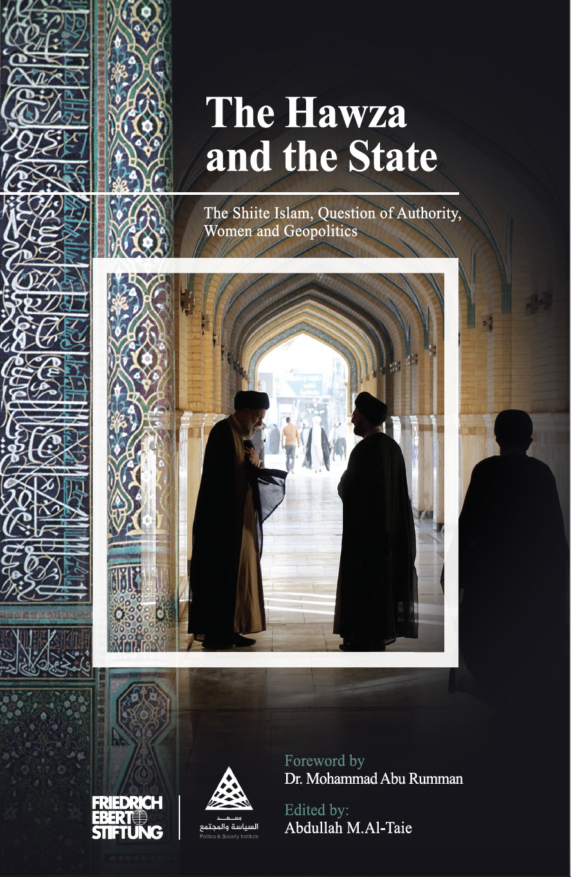An Analysis of Shi’ite Political Thought
Mohsen Kadivar. “An Analysis of Shi’ite Political Thought” in Abdullah M. Al-Taie (editor). The Hawza and the State: The Shiite Islam, Question of Authority, Women and Geopolitics. Forwarded by Mohammad Abu Rumman. Amman: Friedrich-Ebert-Stiftung, 2023. pp. 3-38.
Abstract:
The paper includes introducing the two essentials of Shi’ite political thought and a brief review of Shi’ite political thought in the time of Imams’ absence.Imamate and Justice are two major points shaping the Shi’ite denomination’s doctrine and political philosophy.
Imamate is one of the vital elements or the first and the most important factor in Shi’ite Islam. The Imam is the successor of the Prophet in these aspects: First, he is the successor of the Prophet in the authentic interpretation of the Qur’an and Prophetic Tradition. According to this dimension, the Imams are the third source of Islam (after the Qur’an and the Prophetic Tradition). Second, the Imams – same as the Prophet – could be the political rulers of their times. Third, the Imams were the Islamic Saints and they have also obtained a formative mandate. Imams as political rulers should be elected by the people because this role of being a political ruler was different from being an authentic source of Islamic knowledge and Islamic Sainthood.
From the Shi’ite perspective, Political Imamate is crystallized in the rulership of Ali ibn Abi Talib. Any theory or practice in jurisprudence, theology, ethics, commentary of the Qur’an, hadith compilations and its commentaries, mysticism, philosophy, and politics under the label of Shi’ism, which is inconsistent with the teachings of Imam Ali, is unacceptable. Also, Ali’s political teaching is the standard for Shi’ite political thought.
The Major Political Thought of Imam Ali ibn Abi Talib: mutual rights of the ruler and ruled; the fallibility of the ruler and his need for public monitoring and guidance; ruling that is based on mercy and forgiveness for all people without any religious discrimination; the rights, justice, public opinion, the satisfaction of the middle class, and caring for the lower class; the sanctity of contracts especially with the enemy; the sanctity of life and the high protection of innocent people’s life; and freedom of speech as the cornerstone of Shite political philosophy.
Justice is the second doctrinal element of Shi’ite political thought. Although justice is the notion of the divine attribute, simultaneously, it is the cornerstone of ethical objectivism. Its correlation with political thought was the necessity of a just ruler and a just state. The major result of this Shi’ite political doctrinal point is the right to protest and rise or armed rebellion against an unjust/corrupt ruler. This right is one of the essentials of political philosophy before the conditions of the ruler.
The unjust ruler is dismissed, his governance is illegitimate, obedience to his commands is prohibited (haram) and his support in any way is forbidden (haram), except if it is to remove harm from oppressed mankind. The martyrdom of Imam al-Hussein has been a source of inspiration for various resistance movements and revolutions throughout Shi’ite history. Understanding Shi’ite political thought is impossible without considering the doctrine of justice and its consequences such as the right to an uprising against unjust rulers, which is crystallized in al-Hussein b. Ali’s maxims and teachings. Shi’ite political thought without the centrality of justice and al-Hussain b. Ali’s maxims and teachings are meaningless and foundationless.
Shi’ite political thought in the time of Imams’ absence continued eleven centuries to the present time and has been full of diversity in political theory. The approaches of Shi’ite scholars to politics could be classified into five stages:
First Stage: The Non-political theory of the ’guardianship of the jurists’.
Second Stage: The guardianship of the jurists in religious affairs and the kingship of a powerful Shi’ite in profane affairs.
Third Stage: The general guardianship of the jurists and the permitted kingship of the Shi’ite sultan.
Fourth Stage: The legitimacy of the Constitutional State without the permission of the jurists.
The Fifth Stage: The Islamic Republic of Iran and its Aftermath.
Ayatollah Khomeini’s political theory is in the absolute minority not only in the history of Shi’ite fiqh but also in contemporary Shi’ite fiqh.
The Epilogue of the paper includes final remarks on Shite contemporary political thought.



